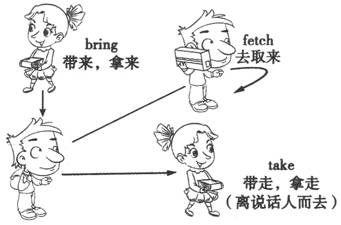字号: 默认 大 中 小
一、知识概述
1.学习和掌握本单元出现的生单词、词组和句型。
2.学习和掌握含有情态动词的被动语态。
3.复习和巩固what与how引导的感叹句。
4.能听懂含有情态动词的被动语态结构的句型;学会谈论允许和不允许做的事情;针对允许和不允许做的事情发表自己的观点。
二、单元重难点解析
1.I don’t think sixteen-year-olds should be allowed to drive.
我认为不应该允许16岁的青少年开车。
(1)宾语从句跟在think,believe,suppose,expect等的动词后,且主句主语是第一人称(I, we),变否定句时,要在主句上否定,即“否定转移”;变反意疑问句时,附加问句要与从句一致。
e.g.I think you are right.
我认为你是对的。
→I don’t think you are right.
我认为你是不对的。
I don’t think he is clever, is he?
我认为他不聪明,是吗?
“否定转移”的5个常用词:
我认为(think)猜想(suppose)与想象(imagine)都不可相信(believe),我期待着(expect)你的回答。
注意:若主句的主语是第二、三人称,变否定句时,要在从句上否定;变反意疑问句时,附加问句要与主句一致。
e.g.They think you are right.
他们认为你是对的。
→They think you are not right.
他们认为你是不对的。
→They think you are right, don’t they?
他们认为你是对的,是吗?
(2)sixteen-year-olds在此句中用作名词,意为“16岁的青少年”。
e.g.Fifty-year-olds should retire.
50岁的人该退休了。
拓展:“基数词-名词(单数)-形容词”构成的词通常用作形容词,作前置定语。
e.g.She is an eight-year-old girl.
她是一个8岁的女孩。
(3)allow为动词,意为“允许;准许”,常用于下列结构中:
① allow sb. to do sth. 允许某人做某事
e.g.The teacher allowed him to go into the classroom.
老师允许他进入教室。
② allow doing sth 允许做某事
e.g.We don’t allow smoking in public.
我们不允许在公共场合吸烟。
③ be allowed to do sth. 被允许做某事
e.g.Passengers are not allowed to smoke.
乘客不被允许吸烟。
注意:allow sb. to do sth中,sb. 作宾语,动词不定式作宾语补足语;allow doing sth.中,doing sth.是动名词短语作宾语。
2.I’m going to bring my new camera to take lots of photos!
我打算带我的新相机去拍许多照片!
(1)bring此处为及物动词,意为“带来;拿来”。
e.g.He brought me a present yesterday.
昨天他带给我一件礼物。
辨析:bring,take与fetch
① bring表示“带来;拿来”(从别处带到说话者处)。
e.g.Bring your friend to the party.
请带你的朋友来参加聚会。
② take表示“拿走;带走”(离开说话者或被谈到的人或某个具体的位置)。
e.g.Take the letter to the post office.
把这封信送到邮局去。
③ fetch表示“去取来”,既包括“去”的意思,又包括“来”的意思。
e.g.I asked her to fetch me an evening paper.
我让她去给我取一份晚报来。
(2)take photos意为“拍照”。
e.g.Could you help me take some photos?
你能帮我拍几张照片吗?
3.When I was two running through the field, she made sure I was safe and kept me from danger.
当我是一个在田间奔跑的两岁孩童时,她确保着我的安全,让我避免危险。
make sure意为“确信;务必;查明;弄清楚”。常用于祈使句中,表示请求或要求对方按照要求做某事,其后常接that引导的宾语从句或of短语。
e.g.Make sure that you pick us up at five o’clock.
你务必要在5点钟来接我们。
We made sure of our seats for the movie.
我们订好电影院的座位了。
4.When I fell and hurt myself, she gave me a hug and lifted me up.
当我跌倒和伤到自己时,她给我一个拥抱,并把我高高举起。
(1)hurt oneself意为“伤到自己”。
e.g.Did you hurt yourself?
你伤着自己了吗?
(2)give sb. a hug意为“给某人一个拥抱”。此处hug用作名词,意为“拥抱”。
e.g.She gave her mother a big hug.
她热烈地拥抱了她的母亲。
拓展:hug还可用作动词,意为“拥抱”。
e.g.They hugged each other.
他们相互拥抱。
(3)lift为动词,意为“举起,抬高”。
e.g.The old man can’t lift the box.
这个老人搬不起这个箱子。
She lifted her hand to knock at the door once again.
她再次举起手来敲门。
拓展:lift还可用作名词,意为“电梯”。
e.g.It’s on the eighth floor. Let’s take the lift.
它在8楼,咱们乘电梯吧。
5.I should not be told what to do!
我不需要(你)告诉我做什么!
what to do意为“做什么”,此处为“疑问词+动词不定式”结构,在句中作宾语。
e.g.I can’t decide what to do next.
我不能决定下一步做什么。
拓展:“疑问词+动词不定式”结构中,疑问词包括疑问代词who, whom, what, whose及疑问副词when, where和how。
e.g.I am thinking about how to solve the problem.
我正在考虑怎样解决这个问题。
Where to look for him is a problem.
问题是到哪儿去找他。
He taught me how to pronounce it.
他教我如何发音。
The main problem is whether to work in this company.
最主要的问题是是否在这家公司工作。
6.I regret talking back, not listening to Mom.
我懊悔(跟妈妈)顶嘴,懊悔不听妈妈的话。
(1)regret为及物动词,意为“遗憾;惋惜;懊悔”,其后可接名词、代词、that/what引导的从句、动词-ing形式或动词不定式作宾语。
e.g.If you don’t do it now, you’ll only regret it.
如果你现在不做,你一定会后悔的。
I deeply regret what I said.
我非常后悔说了那些话。
辨析:regret doing sth. 与regret to do sth.
① regret doing sth. 对做过的事感到遗憾、后悔(已做)
e.g.I regret telling her what I thought.
我为告诉了她我的想法而后悔。
② regret to do sth. 对要做的事感到遗憾(未做)
e.g.I regret to have to do it, but I have no choice.
我很遗憾必须做它,我别无选择。
拓展:regret还可作名词,意为“痛惜,懊悔,遗憾”。
e.g.She expressed her regret at/over the decision.
她对这个决定表示懊悔。
(2)talk back意为“回嘴;顶嘴”。
e.g.Don’t talk back to your mother like that.
不要和你的妈妈那样顶嘴。
Little children should not talk back to their parents.
小孩子不应该跟他们的父母顶嘴。
7.No, I don’t agree with this.
不。我不赞同这个观点。
agree with表示“同意某人”或“同意某人的意见、观点”等。
e.g.I agree with what you said.
我同意你所说的话。
He agreed with me.
他同意我的意见。
拓展:
① agree to主要用来表示一方提出一项建议、安排、计划等,另一方同意协作。
e.g.I agreed to their arrangement.
我同意了他们的安排。
② agree on主要指双方通过协商后在某一点上取得一致意见或达成协议。
e.g.We agreed on the question.
我们就这个问题达成了一致意见。
③ agree to do sth. 同意做某事
e.g.I agreed to start early.
我同意早动身。
④ agree+(that)从句意为“同意,赞同……”。
e.g.She agreed that I was right.
她同意我是对的。
8.They can learn a lot from working.
他们能从工作中学到很多。
learn…from…意为“从……学到……”。
e.g.You can learn a lot from watching games.
你能从看比赛中学到很多。
He learned a lot from his father.
他从他父亲那里学到了很多。
拓展:
① learn to do sth. 意为“学习做某事”。
e.g.We should learn to relax.
我们应该学着放松。
② learn from sb. 意为“向某人学习”。
e.g.We should learn from Lei Feng.
我们应该向雷锋学习。
③ learn… by oneself意为“自学”,相当于teach oneself。
e.g.The man can learn English by himself.
=The man can teach himself English.
这个人能自学英语。
④ learn about/of意为“了解,知道”。
e.g.The more you learn about the Chinese history, the more you enjoy living in China.
你了解中国历史越多,你就越喜欢住在中国。
9.Parents should give teenagers chances to make their own decisions.
父母应该给青少年自己做决定的机会。
(1)chance作为可数名词,意为“机会,可能性”。其后常接动词不定式或“of doing”形式,即(have) a chance to do…= (have) a chance of doing…意为“有机会做……”。
e.g.It’s a good chance to learn from others.
这是一个向他人学习的好机会。
She has a chance to make a speech.
=She has a chance of making a speech.
她有一个做报告的机会。
(2)make one’s own decision意为“自己做决定”,相当于make a decision for oneself。其中decision是动词decide的名词形式,意为“决定,决心”。
e.g.Teenagers should be allowed to make their own decisions.
=Teenagers should be allowed to make decisions for themselves.
应该允许青少年自己做决定。
10.That is why many Chinese adults continue to live with their parents.
那就是许多中国的成年人继续跟他们的父母住在一起的原因。
(1)That’s why… 意为“那就是……的原因”,其中why引导的句子作表语,是表语从句。
e.g.That’s why I don’t want to leave here.
那就是我不想离开这儿的原因。
I got up late. That’s why I missed the bus.
我起床晚了,那就是我没赶上公共汽车的原因。
(2)continue此处为及物动词,其后可接名词、代词、动词不定式或动词-ing形式作宾语。
e.g.After drinking a cup of coffee, I continued to do my homework.
喝了一杯咖啡后,我继续做我的家庭作业。
He picked up his book and continued reading.
他拿起书继续读。
